Key Takeaways:
Overview – Solid music app security starts with understanding the full attack surface: user data, payments, and listening habits all need airtight protection from day one.
Why Secure – A secure music app avoids lawsuits, app-store bans, and churn by turning airtight privacy into a competitive edge users can feel.
Threats – The top music app threats are weak logins, leaky APIs, outdated SDKs, and plaintext traffic—fix these and you cut most breach risk.
Best Practices – Ten proven music app best practices (encrypt everything, MFA, RASP, pen tests) build a multilayer barrier that hackers hate.
Tools – Stack purpose-built music app security tools like Auth0, Firebase App Check, and Cloudflare to lock gates, spot anomalies, and stop DDoS.
JPLoft – Partnering with JPLoft, a top company for music app security means encryption, AI monitoring, and compliance are woven into every feature.
Let’s face it, music apps do way more than just stream your favourite tracks.
They store user data, payment info, playlists, listening habits, and even personal preferences. And that makes them an increasingly hot target for hackers.
Music app security isn’t just an afterthought; it’s your frontline defence. If you're in the race to build the next Spotify or Apple Music, then you need to keep your music app secure from the start.
From ensuring end-to-end encryption to safeguarding user credentials and payment gateways, your security setup can make or break user trust. Neglect it, and you risk data breaches, lawsuits, bad press, and users jumping ship to more secure platforms.
So, before you push a single line of code, think security-first. Because in 2025, users expect more than just a killer UI; they expect privacy, trust, and protection baked into every beat.
Overview of Music App Security
Music app security means safeguarding user data, payments, and personal listening history within streaming platforms.
It’s no small matter: 75% of mobile apps fail basic security checks, and music apps are common targets for cybercriminals.
In 2023, data breaches in the music sector rose 54%, with 5.5 million risky app installs and average breach costs hitting $2.73 million.
Nearly 30% of users have faced some form of account compromise, making it essential to prioritize safety measures.
If you want to create a music app, fun features matter, but rock-solid security keeps users dancing with confidence. In short: Secure your app to keep the music playing and the risks fading into the background.
Reasons Your Music App Needs to be Secure
In today's digital music era, customers don't stream; they trust. And when that trust is shattered, your brand reputation is the first casualty.
Here's why you need to keep your music app secure, particularly in a market with cutthroat competition and sky-high expectations.
1. Data Breaches Will Kill User Trust
One of the biggest risks in music app security is the exposure of personal information, names, emails, payment details, and even listening histories.
When compromised, consumers don't come back. And that ripple effect can sink your app ratings, increase churn, and put the brakes on growth.
2. Financial Loss and Legal Trouble
The cost of ignoring security in your music app is far higher than technical frustrations.
You might get sued, fined under legislation such as GDPR or CCPA, and incur hundreds in recovery expenses.
It's less expensive to get security right in the first place than to clean up after a disaster.
3. Platform Bans and Blacklisting
App stores care about security.
If a vulnerability is discovered, your app might get yanked without notice.
That's why music app security needs to be baked in, not bolted on after release.
4. Competitive Advantage and Brand Loyalty
Why you should keep your music app safe isn't all about disaster avoidance; it's about differentiation.
Users will be more likely to remain on a platform that is privacy and security-conscious. It's a trust indicator that generates long-term loyalty and higher ratings.
Now that you have gained knowledge about why securing your music app is non-negotiable, let’s get to know some of the top threats lurking beneath the surface that could sabotage your music app.
Key Security Threats in Music Apps
Let’s be real: your users care more about how safe their data is than how slick your UI looks.
In 2025, music app security isn’t optional; it’s the backbone of trust. Whether you're planning to start an online music business or scale an existing one, identifying and addressing vulnerabilities is non-negotiable.
Below are the most dangerous yet common music app security flaws that can derail your platform before it even takes off.
1] Weak Authentication Protocols
One of the biggest risks in music app security is depending on outdated or basic login methods.
A simple username and password combo no longer cuts it. Without multi-factor authentication (MFA), brute force attacks and credential stuffing become real threats.
Attackers can easily bypass weak security layers, especially if users reuse passwords. To strengthen app security, implement biometric logins or OTP-based systems.
Always hash passwords and lock down your login APIs against exposure. This single improvement dramatically lowers unauthorized access and gains instant user trust.
2] Insecure Data Transmission
Leaving data in transit insecure is one of the most obvious top security errors that developers continue to make.
If user credentials, payment information, or streaming behaviour are sent over HTTP rather than HTTPS, these can be intercepted by the attacker through man-in-the-middle (MITM) attacks.
Robust security measures such as SSL/TLS encryption are essential. Never send sensitive information in plaintext. This includes API calls, audio streams, and even analytics logs.
Incorporate encryption into your mobile app's communication plan because an unencrypted connection is an open invitation to intruders.
3] Insecure API Security
Your backend APIs are the entrance to everything from user profiles to audio files to subscriptions.
If they are not securely locked down, you're essentially giving out the keys to your platform.
This is a top threat to your music app security since attackers first try probing APIs. Implement authentication tokens, limit requests to evade abuse, and always validate user input.
Endpoint security matters; do not leave them exposed or underdocumented. A breach of API can result in data leaks, server compromise, and even full-scale account hijacking.
4] Obsolete Third-Party Libraries
You may not know it, but third-party SDKs and libraries tend to have known vulnerabilities.
Having an obsolete audio plugin or payment SDK can immediately expose your app to danger.
What makes this a security nightmare is that developers tend to neglect to update these dependencies after launching the app.
To make your app more secure, regularly audit your libraries with tools like OWASP Dependency-Check or Snyk. Eliminate unused or abandoned packages completely.
Being up to date doesn't simply make your app run better, keeping your app from being a ticking time bomb.
5] Unencrypted User Data Storage
Storing sensitive information such as playlists, preferences, or payment info directly on a user's device without encrypting it is reckless.
If the phone is rooted or jailbroken, that data is a sitting duck. This music app security vulnerability gets ignored, but it is extremely dangerous.
Use AES encryption for stored data and do not write out personal information to logs or caches.
Opt for safer local storage mechanisms such as iOS Keychain or Android's Encrypted Shared Preferences so that the privacy of the user is always maintained.
Each byte of the user data must be considered valuable and susceptible.
6] No Runtime Application Self-Protection (RASP)
Runtime Application Self-Protection (RASP) is like having a security guard on your app, live.
It discovers and neutralizes attacks such as code injection or attempts to debug while the application is active.
However, most developers omit it, presuming pre-deployment tests suffice. This is a security blunder, particularly when your application processes real-time transactions or user input.
Incorporate RASP tools to track anomalous behaviour and prevent suspicious activity in real time. It's a proactive measure to strengthen your music app's security in a risky mobile environment.
7] Penetration Testing Avoidance
Here's why security is usually an afterthought in development and why that's bad news: teams are rushed to ship quickly, bypass penetration testing, and hope for the best.
But attackers relish predictable logic and messy access controls. Regular penetration testing finds the invisible vulnerabilities, confirms repairs, and makes sure new features don't add new threats.
You might automate some of it, but manual tests find what bots overlook. Integrate this into your release cycle; it's an integral part of long-term app security and scalability.
8] Broken Access Control
Access control decides who can see or do what in your app.
If it's busted, users could access data that's not theirs or, worse, beyond admin capabilities.
This security risk in music streaming apps usually escapes attention until actual harm is caused. Enforce tight role-based access controls on frontend and backend. Validate edge cases such as URL tampering or forced browsing.
Even if your UI masks a feature, without backend enforcement, it's still at risk. Accurate access control means your app not only runs well—it runs safely.
9] Disregarding Compliance and Regulatory Guidelines
Disregard for security guidelines such as GDPR, CCPA, or SOC 2 is more than legal oversight; it's a music app development challenge that affects marketplace reach and reputation.
App stores now audit security compliance more rigorously, and customers expect data transparency.
Not complying with regulations can result in bans, fines, or blacklisting by the large platforms.
To skip all that, record your data flow, collect user consent correctly, and architect your system on privacy-first principles. This isn't box-checking, it's trust-building.
Knowing threats isn’t enough; let’s get to know about some of the best practices to keep your music app secure.
Best Practices to Keep Your Music App Secure
Let’s be honest: your users don’t just want great sound.
They want to know their data’s safe, their payments are protected, and their private moments aren’t up for grabs.
That’s why the security of music streaming apps should never be an afterthought.
From user profiles to payment gateways, everything needs to be locked down.
Here are 10 music streaming app security best practices to secure your users' data and your reputation.
1. Encrypt Everything You Store or Send
Don’t let personal data float around in plain text.
Whether it’s login info or a saved playlist, encrypt it.
End-to-end encryption ensures only the right person sees the data. This is a non-negotiable when dealing with the security of your music app.
Think of it as your app’s invisibility cloak; hackers can’t steal what they can’t read.
2. Enable Multi-Factor Authentication (MFA)
Passwords aren’t enough anymore.
People reuse them, forget them, and hackers guess them.
Adding MFA—like biometrics or one-time passcodes gives your users serious peace of mind.
And it makes your app instantly more trustworthy.
If you’re just getting started and planning to start something new, MFA should be one of your first security features.
3. Lock Down Your APIs
APIs are like doors—some should stay closed.
Yet too many apps leave them wide open to abuse.
Use token-based authentication, throttle requests, and always validate input.
This stops bots, data scrapers, and brute-force attackers cold.
It’s one of the best practices for security of music apps, especially when connecting to third-party systems or user accounts.
4. Keep Third-Party Tools Updated
Relying on SDKs or plugins?
Good. But only if they’re updated regularly.
Outdated libraries are hacker magnets.
And most breaches happen because someone forgot to click “update.”
This is one of the lesser-known issues keeping every dependency secure as your app grows.
Automate updates if you can. If not, audit monthly. Your app’s safety depends on it.
5. Don’t Collect What You Don’t Need
Less data = less risk.
That’s the simplest way to improve the security of your music streaming apps.
If you don’t need a user’s location or birthday, don’t ask for it.
Store only what’s necessary, and delete what’s no longer needed.
Users love apps that respect their privacy—and hackers hate them.
6. Test Your App
Want to know if your app is secure?
Try to break it.
Penetration testing reveals what normal QA can’t, like weak spots, unprotected routes, or logic bugs.
Make it part of every launch cycle.
This isn’t a “maybe later” step.
Pen testing is a must and considered one of the best practices for your music streaming app security.
7. Add Real-Time Monitoring and RASP
Once your app’s live, anything can happen.
That’s where RASP (Runtime Application Self-Protection) comes in.
It watches for sketchy behaviour inside your app—like someone trying to reverse engineer your code.
It blocks threats before they become breaches
If you’re looking to integrate AI in music apps, this is a smart area to apply it—not just in recommendations, but in real-time protection too.
8. Set Role-Based Access
Not every user needs access to everything.
Limit what different roles can do in your app.
Listeners, moderators, and admins should all see different dashboards.
This reduces the chance of accidental damage or intentional misuse.
Access control is a core part of the security measures for your music streaming app, especially if you offer premium features or admin tools.
9. Stay Legally Compliant
Ignoring GDPR or CCPA isn’t just risky; it can get you booted from app stores.
Make your privacy policy clear. Get consent properly. Offer easy data export or deletion.
Many mobile app development companies skip this until regulators come knocking.
Don’t be one of them. Build compliance into your security roadmap from day one.
10. Watch for Strange Behaviour Automatically
You can’t manually monitor everything.
Use AI-based systems to spot unusual patterns—like multiple failed logins or traffic from odd locations.
These tools help you respond fast and stay ahead of threats.
And if you're already working with a tech partner, make sure they offer services that include behavioural analytics and alerts.
That way, you’re not just reacting—you’re predicting.
11. Use AI to Watch for Suspicious Behaviour
Security doesn’t end when you launch the app.
It’s ongoing.
Use AI-powered tools to monitor strange activity—like bots, unusual logins, or people trying to cheat your premium features.
That’s where AI in music apps gets interesting—because it’s not just for playlists anymore.
It’s for keeping your platform safe, too.
And here’s the thing, none of this is rocket science. But skipping these basics could cost you big.
Give me a transition line from this section to the tools to use to make your music app secure.
So, you’ve got the best practices in place. Great—but to truly lock things down, you need the right tools backing you up.
Let’s talk about it in the next section
Top Tools to Secure Your Music Streaming App
The security of streaming music apps goes far beyond just preventing logins from getting hacked.
You’re dealing with user data, audio content, transactions, and sometimes even location and behavioural patterns.
In short, your app becomes a vault. And to protect that vault, you need the right tools.
There are dozens of options out there, but here are the top 10 tools for music app security that actually make a difference.
If you are starting out, each of these plays a unique role in boosting security, from login protection to real-time monitoring.
For a moment, you might feel that they can increase your cost to develop a music app, but honestly, they also prevent far costlier disasters later.
Below given a table showing tools to secure your music streaming apps.
|
Tool Name |
Category |
What It Does for Security |
|
Auth0 |
Authentication & Authorization |
Adds multi-factor authentication and secure login for users across all platforms. |
|
Firebase App Check |
API & Backend Protection |
Blocks tampered or unauthorized clients from accessing your backend services. |
|
AppSealing |
Runtime Application Protection |
Offers real-time shielding against reverse engineering, tampering, and malware. |
|
Snyk |
Vulnerability Management |
Scans your codebase and libraries for known security flaws in real-time. |
|
Cloudflare |
DDoS & Bot ProShield |
Shields your app from DDoS attacks, spam, and bad bot traffic before it reaches your server. |
|
OWASP ZAP |
Penetration Testing |
Simulates hacker attacks to find vulnerabilities before real ones exploit them. |
|
Datadog Security |
Anomaly & Threat Detection |
Monitor behaviour and app logs to flag suspicious activity instantly. |
|
Keycloak |
Role-Based Access Control |
Manages user roles, permissions, and secure session handling efficiently. |
|
Bitwarden |
Secure DevOps |
Stores credentials securely for your team during app development and deployment. |
|
Tailscale |
Secure Networking (VPN) |
Creates encrypted tunnels to keep internal dev tools and APIs hidden and protected. |
Each of these is a powerful music streaming app security tool you can implement during or after development.
And the best part? Most of them play nicely together.
With this being said, time to talk about future trends that can shape your music streaming app security.
Top Future Trends in Music App Security
As music apps evolve to offer personalized recommendations, immersive streaming, and smarter user experiences, the security of your music streaming apps must evolve too.
We're entering a phase where data privacy, real-time protection, and user trust are just as important as audio quality and UI.
It’s no longer about patching security aft;r launch, it’s about building it into the DNA of your product.
So, let’s explore where music streaming app security is headed and how you can future-proof your platform from day one.
Here are five major music app trends reshaping the top security measures for your music app:
1. AI-Powered Threat Detection and Response
AI is no longer just for playlists; it’s becoming a frontline defender.
Future music apps will use machine learning models to detect odd behaviours: like login attempts from strange locations, rapid account switches, or bot-like activity.
These tools will analyze behavior in real-time and flag threats instantly, sometimes even before they escalate.
And if you're serious about getting ahead of these threats, exploring the services of an AI app development company could be your smartest next move.
As streaming grows more global and more complex, AI will be a core pillar in the security of your music streaming apps.
2. Biometric-based Logins
Typing passwords is getting old.
Modern music apps will lean into biometrics, think facial recognition, fingerprints, or even how a user taps and scrolls.
These methods make access more secure and frictionless.
They’re also harder to replicate or steal, making them a huge upgrade in music streaming app security over traditional credentials.
The result? Stronger authentication, better UX, and less risk of account takeovers. To implement these cutting-edge features the right way, working with the best mobile app development company is the smart move.
3. Zero-Trust Architecture Becomes the Norm
The idea behind zero-trust is simple: don’t trust anything by default—not even your own app components.
This means every user request, API call, or system connection will need to be verified continuously.
For music apps dealing with subscriptions, third-party APIs, and dynamic content—this is huge.
It eliminates blind spots and ensures every transaction or access request meets strict security criteria.
This shift will redefine what top security measures for your music app really look like in the coming years.
4. In-App Privacy Controls for Users
Users want control.
Soon, music apps will offer dashboards that let users decide what data to share, what to delete, and what to keep private.
This trend is driven by global regulations and rising user expectations.
It’s about giving users visibility into the data journey from collection to usage.
For developers, it means building transparency directly into the UI and ensuring the backend honours every toggle.
It’s not just good ethics, it’s great security for your music streaming apps.
5. Blockchain for Licensing and Identity Verification
Blockchain isn’t just for crypto.
Music apps are beginning to explore their power for rights management, secure royalty payouts, and even identity verification.
Smart contracts could be used to validate artist royalties automatically, while decentralized IDs could reduce fake accounts.
Though still early, this could become a foundational tech layer in music security.
And as the tech matures, it might eliminate entire classes of fraud and abuse currently affecting music platforms.
For businesses ready to experiment, partnering with experts in Blockchain development services can accelerate the process and help you build secure, future-ready solutions tailored for the music industry.
How JPLoft Can Help You Strengthen Your Music App Security?
Let's be real—developing a music app is cool. Securing it? That's when the real game begins.
Because you're not only curating playlists and artist info—you're dealing with user information, payments, and preferences 24/7.
That's where JPLoft enters the picture.
As a leading music app development company, we don't simply develop features; we develop with vision.
From initial wireframe to deployment, security is woven into every level of your app.
We assist you:
-
Protect your music app with industry-leading tools, encrypted APIs, and safe. architecture
-
Deploy top-level security for your music app such as biometric login, threat monitoring in real time, and GDPR-compliant data flows.
-
Include advanced protection such as runtime application security, behavior monitoring powered by AI, and role-based access control.
-
Run thorough penetration tests prior to launch, not after a breach.
Whether you're creating a music discovery app, a streaming platform, or something crazy innovative, we've got you covered.
We get both the tech and the trust involved in scaling securely.
So if you're passionate about music and even more so about safeguarding the people who use it, the JPLoft one-stop shop team.
Let's create something secure, intelligent, and unforgettable.
Conclusion
In the digital era, music streaming app security is the foundation of user trust and long-term growth.
With millions of people sharing personal data, payment information, and listening habits, every streaming platform must make security a top priority, not just an afterthought.
By implementing robust safeguards, using powerful security tools, and staying ahead of future trends like AI and zero-trust architecture, you can ensure your music app remains safe, reliable, and competitive.
Remember: the most successful music streaming apps are not only about the best sound, but also about the strongest protection, giving users every reason to keep coming back.
FAQs
Music streaming apps handle sensitive data, including user profiles, payment information, and personal preferences. Security breaches can result in data loss, legal action, and loss of user trust, jeopardizing your app’s reputation and growth.
Effective tools include Auth0 for authentication, Firebase App Check for backend protection, AppSealing for runtime security, Snyk for vulnerability management, and Cloudflare for DDoS and bot protection. Integrating multiple tools provides a defence.
Key trends include AI-driven threat detection, biometric logins, zero-trust architecture, user-facing privacy controls, and blockchain for identity and licensing. These advancements are making security more proactive and user-centric.
JPLoft provides end-to-end app development with security woven into every step—from encrypted APIs to AI-powered monitoring and regulatory compliance. Their expertise ensures your app is not only innovative but rock solid against modern threats.





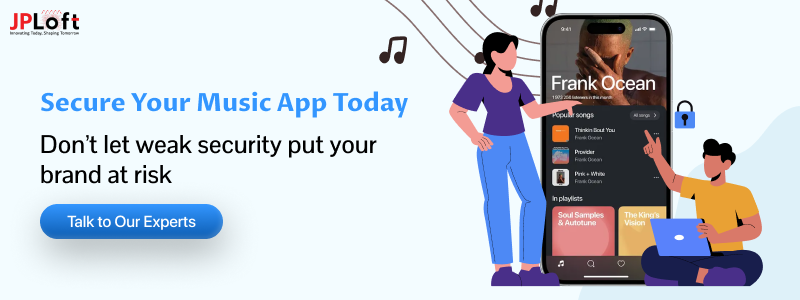
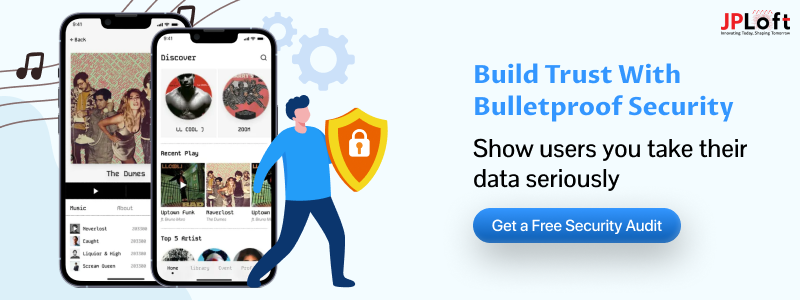

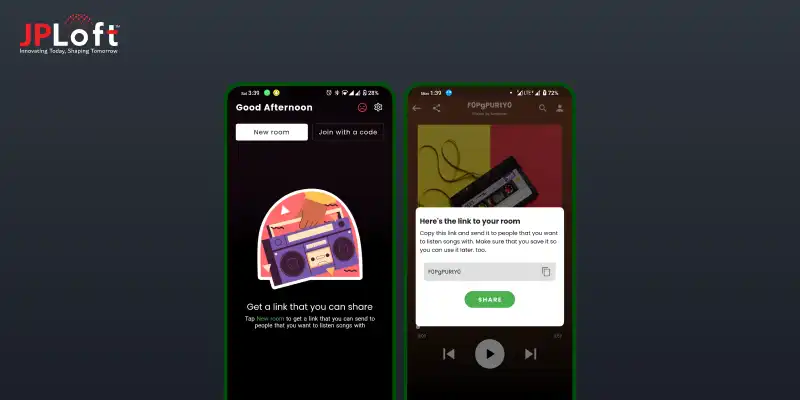
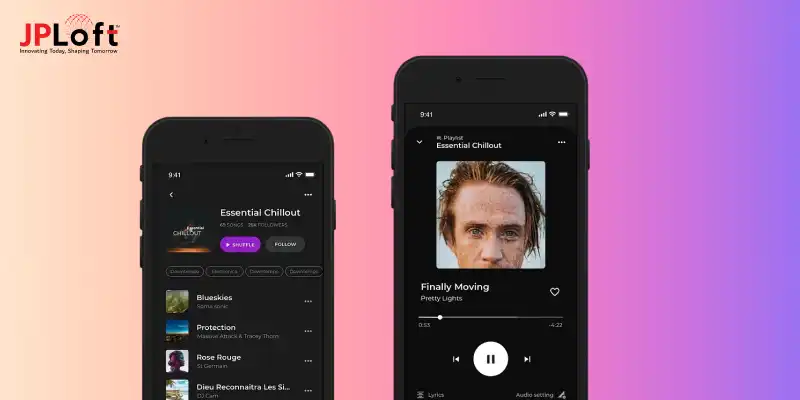
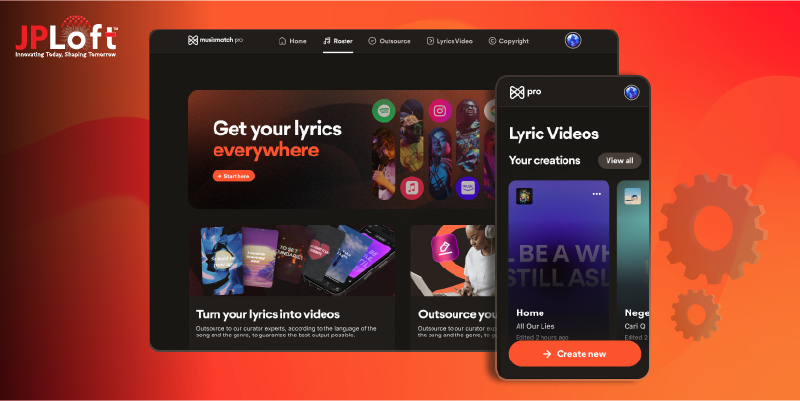


Share this blog